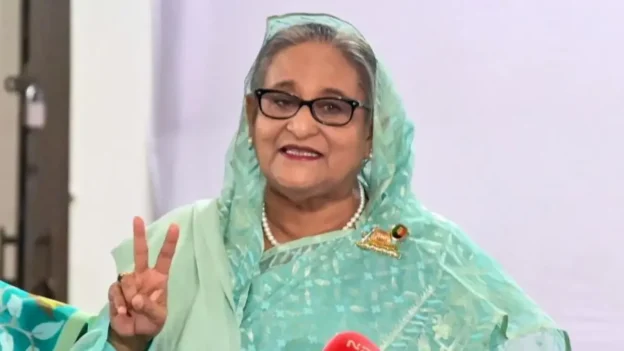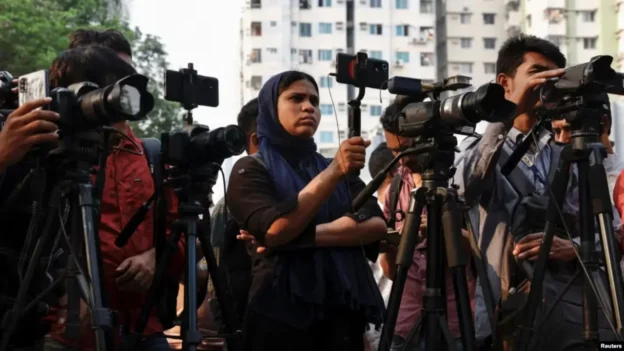With international meddling deepening and domestic unrest brewing, Bangladesh stands at a critical crossroads. The interim leadership under Muhammad Yunus is fast losing credibility—both within and outside the country—while the military and political factions rally for swift elections to restore democratic legitimacy and national sovereignty.
A storm is gathering in Dhaka. Whispers of a military coup are getting louder as the interim government’s Chief Advisor, Professor Muhammad Yunus, inches closer to resignation. His prolonged indecision, backroom dealings, and failure to steer the country toward meaningful reform have infuriated not just political stakeholders but also the military, which now seems poised to intervene.
Behind closed doors, Yunus has been engaging with his favoured political group—the newly formed National Citizens’ Party (NCP)—instead of engaging with a broader national consensus. NCP convenor Nahid Islam confirmed meeting Yunus on Thursday at the state guest house, Jamuna, where he found the Chief Advisor “visibly upset.” Islam admitted, “He [Yunus] said if he cannot do the work he was asked to do—reform the system and prepare for fair elections—then he may have to leave.”
But the situation is no longer about just Yunus. It’s about a nation spiralling into uncertainty—teetering on the edge of being caught in the crossfire of great power rivalries.
The geopolitical minefield
One of the flashpoints threatening Bangladesh’s sovereignty is the so-called “humanitarian corridor” into Myanmar’s Rakhine state—a plan being pushed by the United Nations and quietly backed by the United States. Yunus, according to sources, greenlit the proposal without consulting key stakeholders like the Bangladesh Army, triggering outrage within the military ranks.
Why was the military kept in the dark? What are the real motives behind the corridor?
The Arakan Army (AA), which now controls about 90% of Rakhine—including areas bordering Bangladesh and India—has long distrusted Western intentions, particularly those of the U.S. It has also been historically hostile to the Rohingya population and has shown little interest in facilitating any Western-backed humanitarian operation. Rather, the AA seeks stronger ties with neighbouring India and Bangladesh, not distant powers seeking strategic leverage.
In fact, sources within the Bangladesh military believe the corridor could be used to funnel weapons and money to groups operating within Myanmar, effectively turning Bangladesh into a proxy route for international interests. This, they say, is “completely unacceptable.”
The army’s red line
Bangladesh Army Chief General Waker-uz-Zaman minced no words during a high-level address at Dhaka Cantonment on Wednesday. Speaking to officers from across the ranks, both in person and virtually, he declared that the Army would “not tolerate any activity—domestic or external—that compromises independence, sovereignty, or national integrity.”

General Zaman made it unequivocally clear:
“There will be no corridor—none whatsoever.”
He stressed that such strategic decisions must come only from a democratically elected government, and not from what he labelled an “unelected interim arrangement.” He reminded everyone of the military’s duty to protect national interests, saying, “Such decisions must reflect the will of the people, not the ambitions of outsiders.”
This firm stance has been echoed by a growing chorus of voices—intellectuals, civil society, and hardliners—who now accuse Yunus of allowing Bangladesh to become a pawn in international gamesmanship. Many claim he has achieved little beyond political posturing, while major decisions—ranging from Chinese port deals to water projects—have been made without military or public consultation.
Elections, not excuses
Amid this spiralling crisis, the Bangladesh Nationalist Party (BNP), led by former Prime Minister Khaleda Zia, has turned up the heat. On Wednesday, BNP leaders warned that continuing support for the interim government would be “difficult” without a clear plan for elections by December 2025.
They also demanded the resignation of key advisors—Mahfuz Alam, Asif Mahmood, and National Security Advisor Khalilur Rahman—citing their failure to ensure transparency and accountability. In response, the NCP fired back, threatening to seek the resignation of three other advisors whom they labeled “BNP spokespersons.”
These political fireworks, however, pale in comparison to the military’s looming presence. General Zaman warned sternly: “No more mobs on the streets. We will act decisively to uphold law and order.” He even invoked the memory of January 11, 2007—a reference to a past military-backed intervention—reminding officers of the high cost of political chaos.
In a moment of rhetorical clarity, he asked: “Does anyone want to take my responsibility? If so, step forward and take it.”
A ticking clock
The message is loud and clear: The Bangladesh Army wants elections—and it wants them now. General Zaman has reportedly set an unambiguous deadline: elections must be held by the end of 2025, and a democratically elected government must take over by January 1, 2026.
This timeline is not just a military demand—it reflects a growing national consensus. Ordinary citizens, political parties, and even former protest leaders agree that Yunus’s interim government has outlived its mandate. It was meant to be a temporary fix, not a permanent seat of power.
The longer this uncertainty persists, the deeper Bangladesh slides into the abyss—caught between internal dysfunction and external manipulation.
Bangladesh today stands at a fateful juncture. Will it restore its democratic foundations and chart its own course? Or will it continue to drift, vulnerable to foreign agendas and internal instability?
The time for dithering is over. As General Zaman and political leaders have made abundantly clear, only a legitimate, elected government can navigate the complexities of geopolitics, ensure transparency in foreign policy, and uphold the sovereignty that millions of Bangladeshis fought to secure.
The clock is ticking—and the country cannot afford another misstep.







